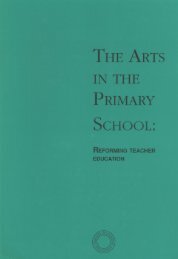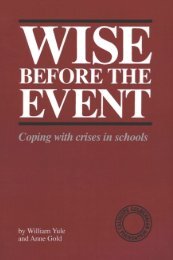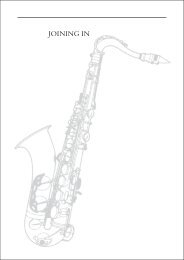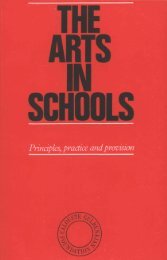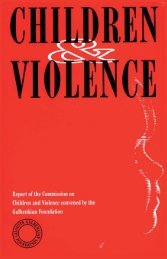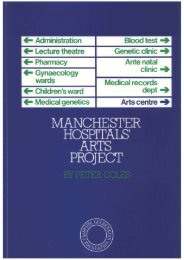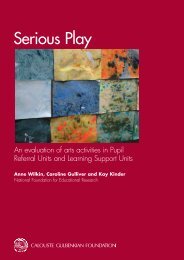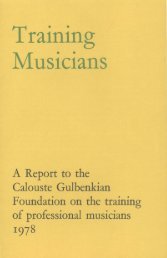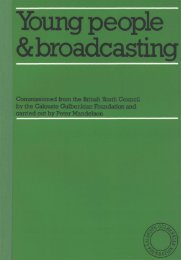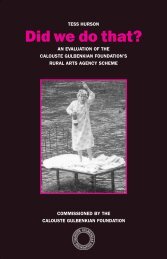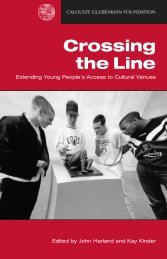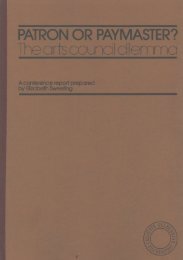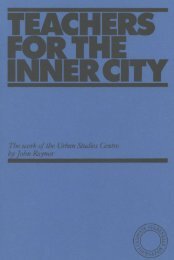Training in the Conservation of Paintings - Calouste Gulbenkian ...
Training in the Conservation of Paintings - Calouste Gulbenkian ...
Training in the Conservation of Paintings - Calouste Gulbenkian ...
You also want an ePaper? Increase the reach of your titles
YUMPU automatically turns print PDFs into web optimized ePapers that Google loves.
APPENDIX C<br />
5. The IRPA is primarily a research <strong>in</strong>stitute, where scientific,<br />
technical and historical research are its major occupations.<br />
<strong>Conservation</strong> Staff<br />
6. There is a staff <strong>of</strong> four/five restorers <strong>in</strong> <strong>the</strong> department concerned<br />
with <strong>the</strong> conservation <strong>of</strong> pa<strong>in</strong>t<strong>in</strong>gs.<br />
Apprenticeship <strong>Tra<strong>in</strong><strong>in</strong>g</strong><br />
7. Though IRPA is primarily a research <strong>in</strong>stitute, it has s<strong>in</strong>ce <strong>the</strong><br />
beg<strong>in</strong>n<strong>in</strong>g taken one/two tra<strong>in</strong>ees a year for a full tra<strong>in</strong><strong>in</strong>g by <strong>the</strong><br />
apprenticeship method last<strong>in</strong>g four years. They receive a small<br />
salary as tra<strong>in</strong>ees, and work closely with <strong>the</strong> restorer staff as apprentices.<br />
These tra<strong>in</strong>ees have, before entry, normally attended art<br />
schools or have a degree <strong>in</strong> art history.<br />
Formal Course<br />
8. S<strong>in</strong>ce its establishment <strong>in</strong> <strong>the</strong> present build<strong>in</strong>g, however, it has<br />
developed, with f<strong>in</strong>ancial aid from <strong>the</strong> University <strong>of</strong> Ghent, and <strong>the</strong><br />
cooperation <strong>of</strong> <strong>the</strong> Rome Centre, ICOM, and UNESCO, a formal<br />
one-year Advanced Course (Cours de Perfectionnement) for ten<br />
fully qualified conservators. This course is <strong>in</strong>tended to serve as a<br />
consolidation <strong>of</strong> <strong>the</strong> students' earlier tra<strong>in</strong><strong>in</strong>g and experience and to<br />
enable <strong>the</strong>m to study and review <strong>the</strong> pr<strong>in</strong>ciples govern<strong>in</strong>g <strong>the</strong> practice<br />
<strong>the</strong>y have learnt.<br />
Qualifications<br />
9. Candidates must be between 20-35 years <strong>of</strong> age and have had at<br />
least three years <strong>of</strong> study <strong>in</strong> a School <strong>of</strong> Restoration, or five years<br />
practical restoration experience under supervision. Candidates may<br />
have received <strong>the</strong>ir tra<strong>in</strong><strong>in</strong>g with<strong>in</strong> <strong>the</strong> IRPA or be from abroad.<br />
Syllabus<br />
10. About one-third <strong>of</strong> <strong>the</strong> course is <strong>the</strong>oretical and <strong>the</strong> rema<strong>in</strong><strong>in</strong>g<br />
two-thirds is practical and <strong>in</strong>cludes visits to o<strong>the</strong>r establishments.<br />
The students on this course are taught by <strong>the</strong> staff <strong>of</strong> restorers<br />
attached to IRPA, four or five <strong>in</strong> number, and visit<strong>in</strong>g restorers and<br />
lecturers, both Belgian and foreign.<br />
Award<br />
11. This course leads to a certificate <strong>of</strong> <strong>the</strong> <strong>in</strong>stitute, which cannot<br />
be equated with any o<strong>the</strong>r <strong>of</strong>ficial degree or diploma.



